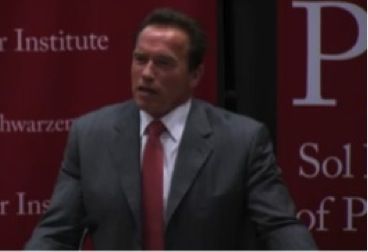Schwarzenegger Leads Public Forum On Climate Change

Created by the former governor himself, the USC Schwarzenegger Institute commits itself to advancing post-partisanship in order to find the best ideas and solutions for the people. With Schwarzenegger being a big advocate for addressing climate change, this institute prides itself on advancing energy and the environment in public policy.
The former governor commenced the forum with a few opening remarks. Schwarzenegger spoke mainly on the need for the public to heed scientists' warnings about the environment before the consequences of climate change become too serious. Comparing the acceptance of climate change to a doctor’s warning about health, Schwarzenegger told the audience, “I am as eager to hear the findings about this assessment as I am to hear the findings of my physical.”
Hilda Blonco, the director of the USC Center for Sustainable Cities, then introduced the main findings of the environmental assessment. According to the report, the southwest region of the U.S. has five distinct issues, the first being that there has been a decline in snowpack and streamflow amounts.
Under federal law, distinct regions of the United States must provide periodic assessments on how a particular region is affected by climate change. Coordinated by the National Climate Assessment (NCA), a group of nearly 240 scientists and experts prepared a comprehensive report detailing how climate change will affect the southwestern part of the United States.
The assessment detailed the impact of climate change on irrigation in the southwest, an increase in the amount of drought and warming, an increase in flooding and erosion occurring in the costal regions of California, as well as projected temperature increases.
After the initial messages, several scientists presented their research that was incorporated into the draft of the climate assessment report.
Phillip Duffy, who works for the Lawrence Livermore National Laboratory, spoke on the use of advanced modeling in scientific projections on climate change. Duffy made the point that, although there are a number of uncertainties that come with climate change data, we should not fear the data.
“We need to learn to work with uncertainty,” said Duffy
Other experts, such as Tom Swetnam, spoke about the increase in the number and intensity of forest fires, while David Pierce spoke about Southern California’s stretched water resources, which will become even scarcer as California becomes a drier region. Rupa Basu also presented her evidence on an increase in heat correlating to an increase in mortality, and Matthew Heberger talked about the dangers in rising sea levels pose to the costal regions of the United States.
Although much of the evidence presented by the scientist presented some bleak outcomes for the southwest if the climate continues to heat up, the panel seemed to agree on the idea that policy intervention could help manage the current effects of climate change and prevent the projected catastrophic effects.
In addition to this panel of judges, several public commentators from a wide variety of industries and organizations also offered their comments on the need for climate change prevention. One particularly popular idea amongst the commentators was made by Dan Jacobson, who said that “reducing global warming does not have to be counter to our economy.”
This was then followed by a short question and answer period by the crowd. When the panel was asked about how scientist were going to compete with the exorbitant amount of corporate money spent against them, Governor Schwarzenegger stepped forward and talked about how Californians supported the climate change laws in California, even though they felt a great deal of opposition from corporate interests.
In an op-ed in the Los Angeles Times, Schwarzenegger expressed similar ideas to the ones expressed in the forum.
“The first step for policymakers — and for ordinary citizens too — is to understand the situation we face…the knowledge in this report is crucial to understanding how to change, to adapt, to prevent and to prepare for future disasters” said the former governor.
The draft of the climate assessment for the southwest region is up for public review until Friday. Following a period of revision and review by the White House and federal agencies, the final version of the National Climate Assessment will be provided to the President and Congress by early 2014.
Reach Staff Reporter Edward Loera here and follow him on Twitter here



